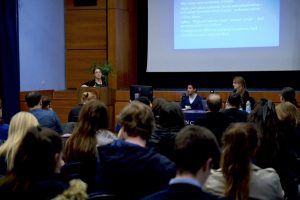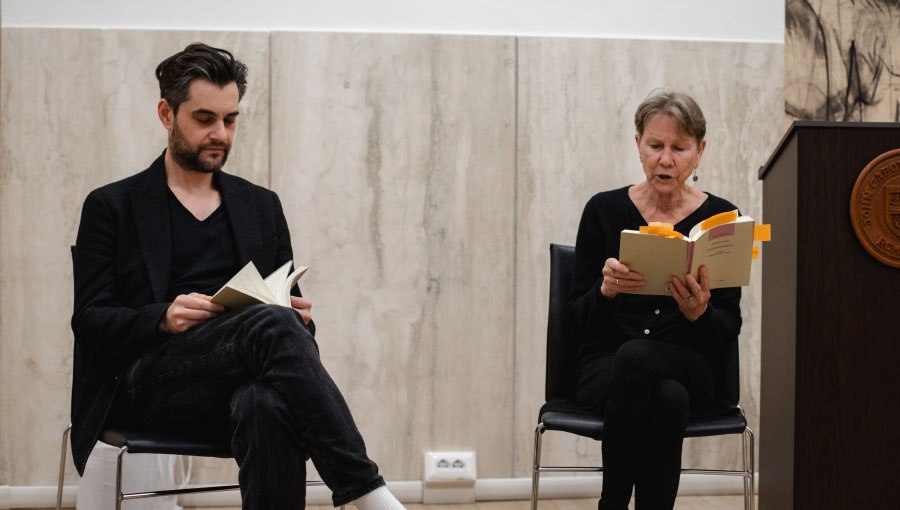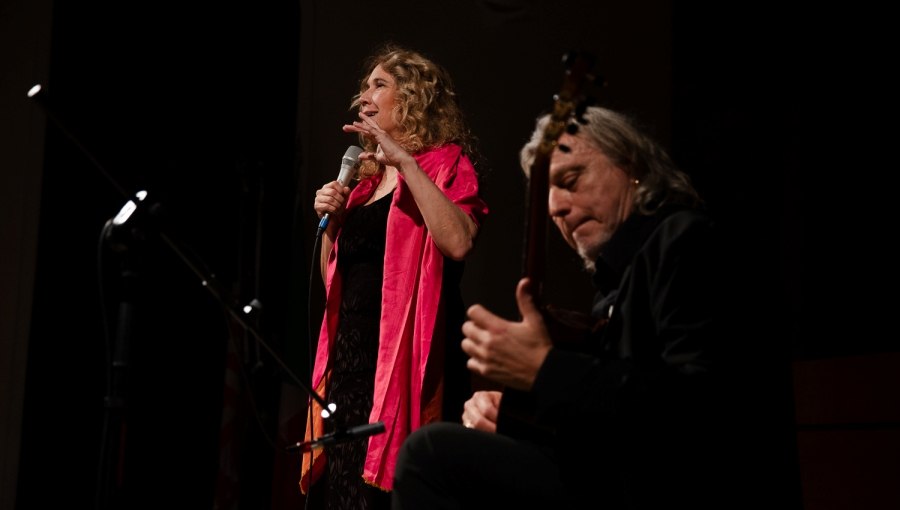"I am not old enough:" Early Marriages in Rome's Slums
The Department of Modern Languages and Literature and Service Learning – Combining Fieldwork and Education hosted a special lecture called “‘I am not old enough’: Early Marriages in Rome’s Slums” on Wednesday, February 7, 2018. Italian Studies Professor and Department Chair Isabella Clough Marinaro introduced guest speakers Angela Tullio Cataldo, a researcher from Associazione 21 Luglio, and Driton Berisha, Project Coordinator at Kosova Education Center.
The lecture started with Professor Clough Marinaro’s brief overview of how and why impoverished minority groups often have no alternative to live in camp-like slums on the edges of Italian cities, especially Rome. Many, but not all, the residents are Roma. According to official EU reports, the Roma are the biggest ethnic minority in Europe, as they are present in all twenty-eight member countries. The exact number of the Roma population in Italy is unknown because the Italian government does not collect ethnic data; however, estimates range between 120,000 and 180,000. The first records of people who may have been Roma in Italy and date back to 1422, which contradicts the stereotypical and offensive representation of Roma as “outsiders” from Europe, recent migrants or nomads. Professor Clough Marinaro further stated that Italian institutions have often justified neglecting Roma by labeling them as “nomads” and assuming that they choose to live in such conditions. While many Roma in Italy live in mainstream housing and are integrated into the broader communities, those in camps often experience terrible conditions and are discriminated in all aspects of Italian society. In reality, the Roma community comprises a complex, rich and diverse set of cultures, in terms of education, income level, and language.
Professor Clough Marinaro ended her lecture by showing videos that tell the stories of two young Roma who live their lives with motivation and passion, in the face of adversity. Ivana is a university student who also works as a kindergarten teacher. She is optimistic about the future and cannot wait to graduate to go on with her life. Kemo is a barista and believes working to be an integral part of his life. He is aware of life’s ups and downs and he embraces them with passion and goodwill.
Then Angela Tullio Cataldo, a Human Rights researcher for Associazione 21 luglio ONLUS, talked about the over 300 slums in Rome, drawing a parallel with Native Americans’ reservations. Established in Italy in the 1980s with regional laws based on the assumption that Roma people are nomads, slums proliferated in isolated locations around Rome. Today, these are intuitionally categorized as “unauthorized camps” (the vast majority), “tolerated camps”, and publicly-built “villages”. Cataldo explained that marriages where both partners are under 18 are very common in these slums. She discussed low life expectancy and poverty, the symbolic importance of virginity and centrality of family contribute to this phenomenon there as in so many other poor societies around the world. The large number of early marriages often cause spouses to interrupt their education and dedicate themselves to the family, which further reduces their life chances and also fuels stereotypes about them. Cataldo concluded her lecture by stating that people who live in camps are so excluded from the opportunities of Italian society that they often feel like they are “living in an alternate reality.”
Lastly, Driton Berisha shared his personal experience as a Rom who now works as a project manager in an NGO in Kosovo, encouraging other young Roma to succeed at school. He is the only person from his community to hold a college degree. He affirmed that the main problems in Roma slums are economic conditions and low life expectancy. On the other hand, he also claimed that NGOs help effect change. In fact, it was precisely through these organizations that Driton was able to leave his native village, complete his university education, and get a job.








